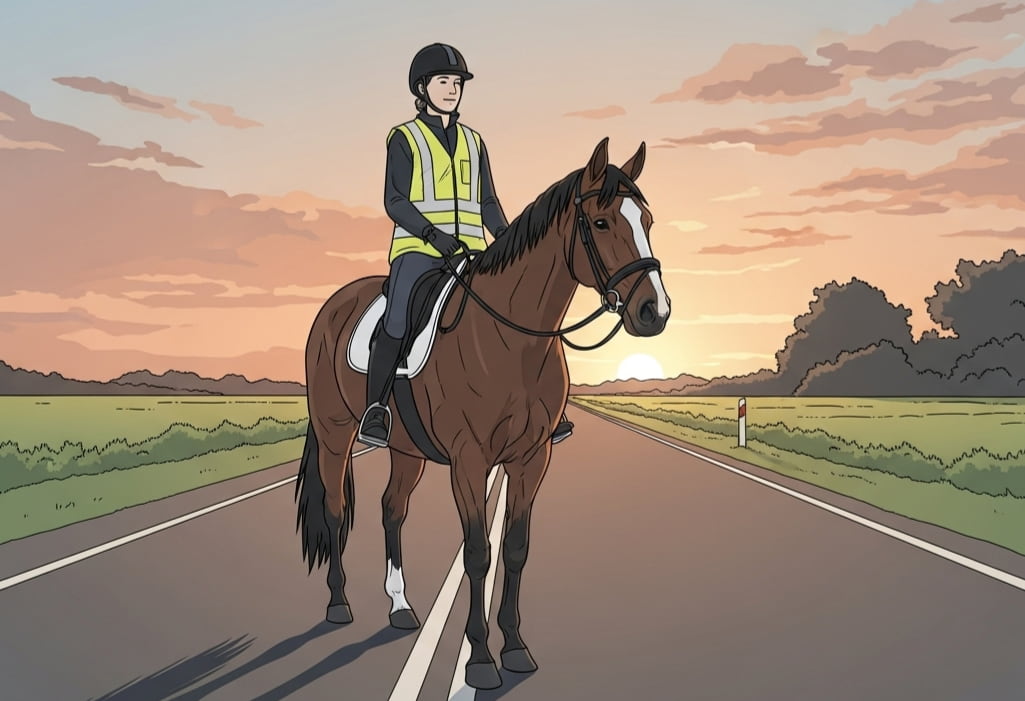Can You Get a DUI on a Horse?
Yes, in some states, you can be charged with a DUI while riding a horse on public roads. Laws vary widely across the United States, and whether a horse counts as a vehicle depends on how each state defines “vehicle” under DUI statutes. A car here refers to any conveyance law recognized for movement on public roads. For example, California explicitly considers a horse a vehicle for DUI purposes, meaning riding while intoxicated can result in fines, license points, or even jail time for repeat offenses.
In contrast, states like North Carolina and Tennessee generally do not include horses in their DUI laws, though riders can still face other legal consequences if their behavior endangers others. Texas, while not including horses under standard DUI statutes, can hold riders accountable under local ordinances or reckless behavior rules.
Riders need to be aware of how these laws apply. Even in states without DUI laws for horses, riding impaired can cause accidents, harm your horse, and create legal or insurance problems. A 2017 case in Florida, where a rider was arrested for riding intoxicated on a highway, shows that authorities take this risk seriously.
We cover horse DUI laws by state, compare them to bicycles and horse-drawn carriages, and explain how to stay safe, avoid penalties, and ride responsibly.
1. What Is a DUI and Does It Apply to Horses?
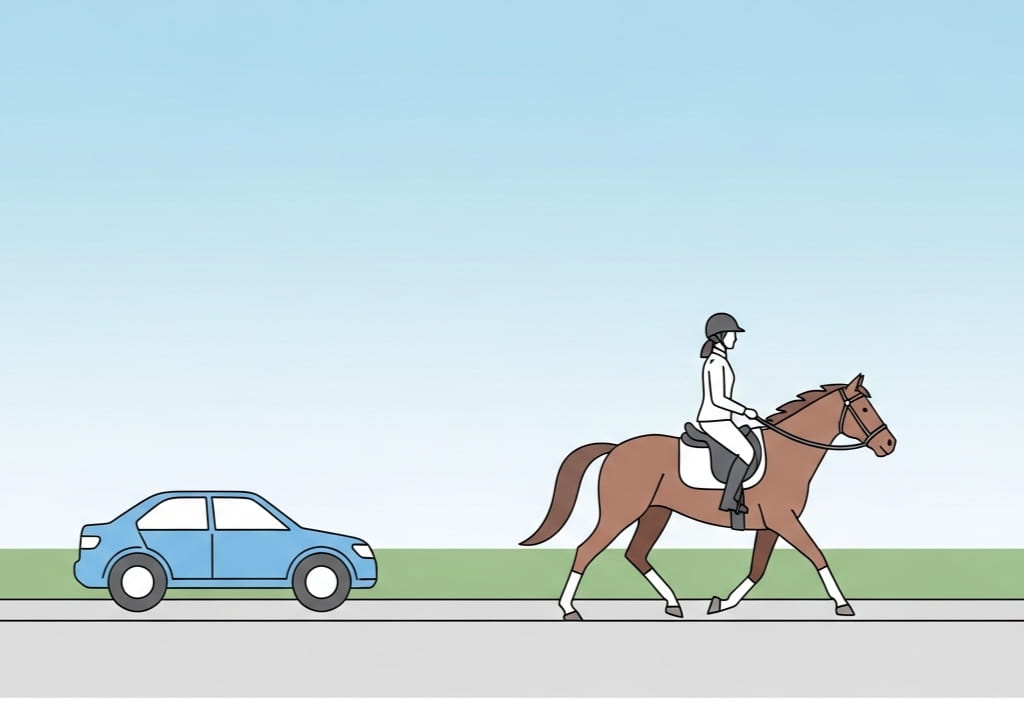
A DUI, or driving under the influence, is a legal charge applied when a person operates a vehicle while impaired by alcohol or drugs. While most people associate DUI with cars, some states extend these laws to non-motorized vehicles, including horses, when ridden on public roads.
Authorities focus on public safety, considering your control of the horse and riding location. Unsafe actions, like losing control or endangering others, can lead to legal consequences. Some states have blood alcohol limits or observation-based tests, so knowing your local rules helps you ride safely and avoid fines.
2. How Each State Handles DUI for Horse Riders
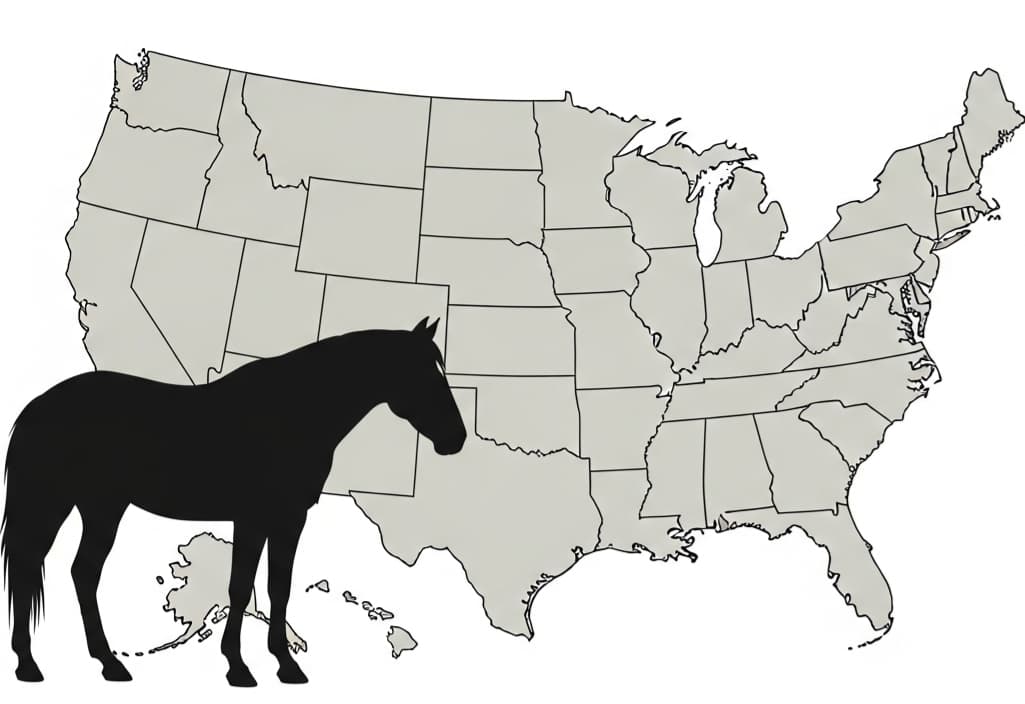
Laws about riding a horse while impaired vary across the United States. Some states treat horses like vehicles under DUI laws, while others do not. Here’s a look at key states and how they handle horse DUI cases.
California
California legally considers a horse a vehicle. Riding while intoxicated can lead to DUI charges similar to those for cars. Penalties include fines, points on your driver’s license, and, in repeat cases, possible jail time. Authorities focus on whether the rider maintains control of the horse and whether public safety is at risk.
Texas
Texas does not include horses in standard DUI statutes, so riding while intoxicated generally does not result in a DUI charge. Riders can still be held accountable for reckless or dangerous behavior, such as losing control of the horse near traffic. Local ordinances may also apply in certain areas.
Florida
Florida treats horses like vehicles when ridden on public roads. Impaired riders can face DUI charges, with penalties including fines, probation, or community service. Authorities consider both the rider’s control of the horse and the surrounding traffic conditions.
Georgia
In Georgia, riding a horse while impaired on public streets can be prosecuted if it poses a safety risk. Courts have treated intoxicated horseback riding similarly to DUI in motor vehicles, with fines and possible criminal records depending on the severity of the incident.
North Carolina
Horses are not classified as vehicles under North Carolina DUI laws. Riders are generally exempt from DUI charges, but reckless behavior while impaired, such as riding into traffic, can still result in fines or other penalties under general public safety rules.
Tennessee
Tennessee DUI laws apply only to motorized vehicles. Horseback riders are not subject to DUI charges. However, public intoxication or reckless conduct laws may still apply if a rider endangers others.
Arizona
Arizona does not consider horses motor vehicles, so DUI laws do not cover horseback riding. Riders should remain cautious, especially on public roads, to avoid accidents or civil liability, which is separate from criminal DUI charges.
Illinois
Illinois DUI statutes do not include horseback riding. Riders are still responsible for safe conduct, and impaired riding that causes accidents or injuries could lead to charges for reckless behavior or civil liability.
3. What Riders Need to Know About Unusual Cases
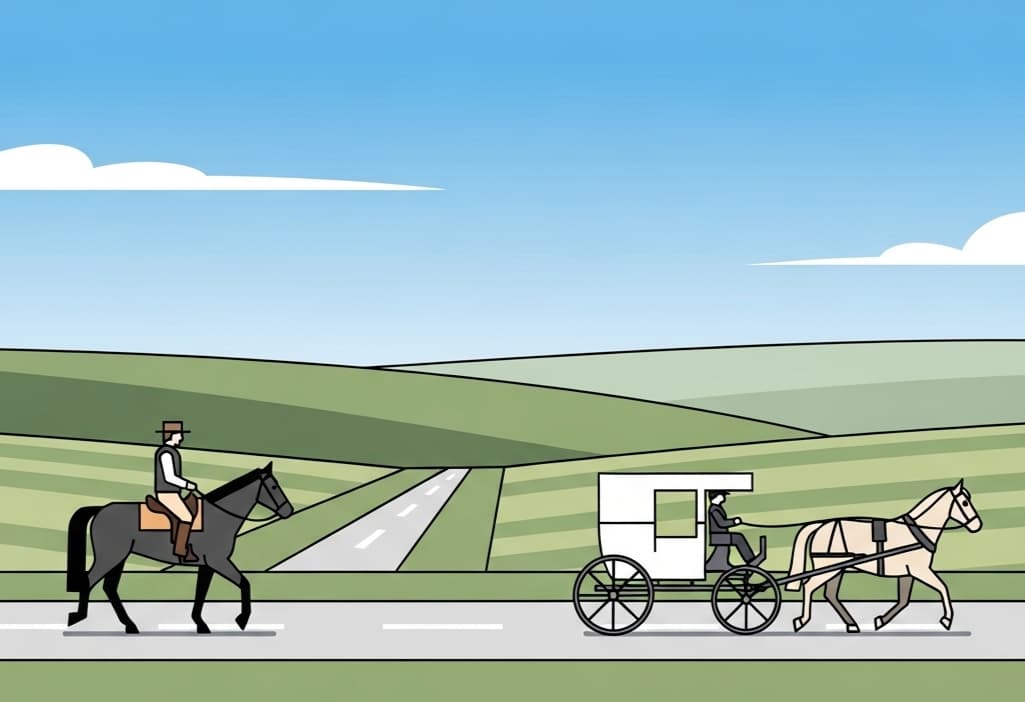
Some states and local communities have unique rules regarding horseback DUI. While these cases are less common, they’re important for riders in rural areas or regions with frequent horse traffic.
Horse-and-Buggy Communities
In states like Ohio and Pennsylvania, horse-and-buggy travel is common, especially in Amish communities. Local laws may treat horse-drawn vehicles similarly to motor vehicles for DUI purposes, applying to both riders and passengers. Operating under the influence can result in fines or other legal penalties.
Montana and Rural Areas
Montana does not have widespread enforcement of horseback DUI, but riding impaired on public roads can still lead to legal consequences if it creates a safety hazard. Rural counties may apply general public safety statutes, such as riding into traffic or losing control of the horse.
Legal disputes show how far-reaching local rules can be. For instance, the Montecito Country Club easement dispute in California highlights how property rights and community safety often intersect, offering a perspective on why horseback laws are enforced differently from one region to another.
Riders should check state and local rules before riding, as penalties vary depending on whether horses are treated like vehicles or general safety laws apply, with some areas relying on observation rather than formal tests.
4. International Guidelines for Horse Riders
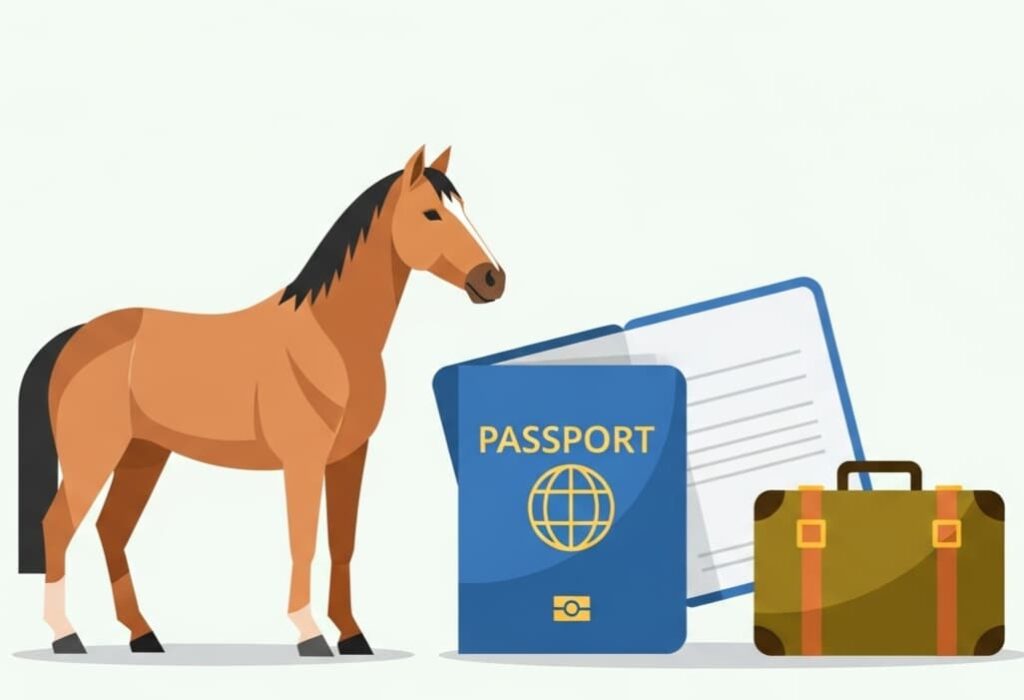
Laws regarding riding a horse while impaired vary widely outside the United States. Riders should be aware of local regulations to stay safe and avoid legal trouble.
Canada
While Canadian DUI laws mainly target motor vehicles, some provinces also apply them to horses on public roads. Enforcement and penalties differ by province. For example, Ontario and British Columbia may hold riders responsible under general public safety laws if impairment leads to unsafe riding or accidents. Consequences can include fines, community service, or criminal liability, depending on the severity of the incident.
Other Countries
In most countries, horseback riding under the influence is not specifically addressed in traffic laws. However, any activity that endangers others or causes accidents can lead to liability or criminal charges. Rules may differ significantly between countries, so riders should check local regulations before riding on public roads or shared pathways.
Being aware of international rules helps riders traveling abroad or living outside the U.S. maintain safe riding practices and avoid unexpected legal issues.
5. How DUI Laws Treat Different Vehicles
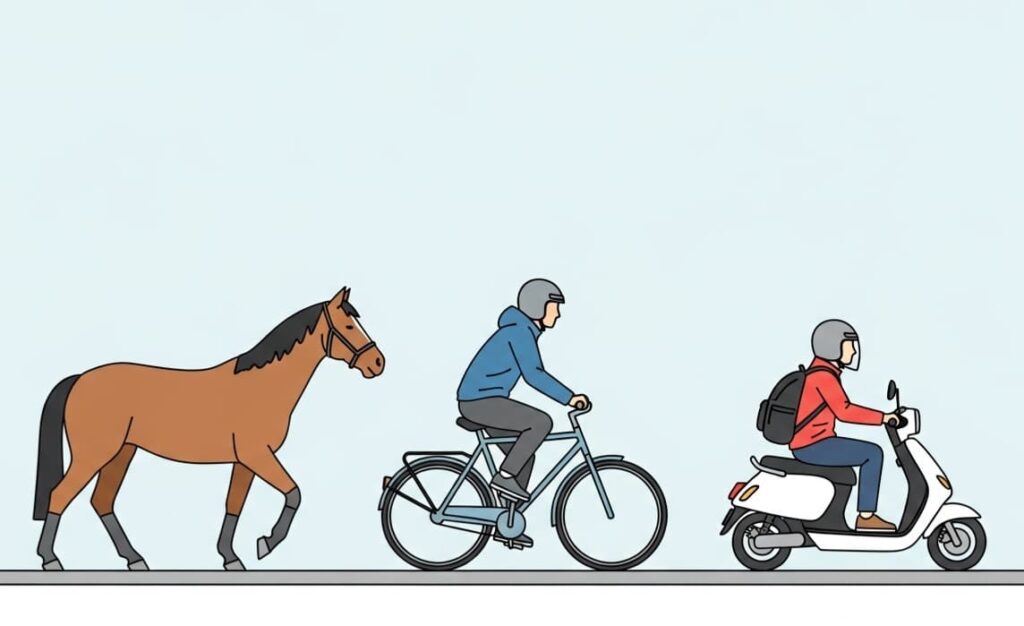
Riding a horse can be compared to using other non-motorized or alternative vehicles, like bicycles and e-scooters. These comparisons help riders understand legal responsibilities, safety expectations, and enforcement priorities.
Bicycles
Many states extend DUI laws to bicycles. Riding a bicycle while impaired can result in fines, points on your driver’s license, or even criminal charges in some jurisdictions. Enforcement usually focuses on whether the rider poses a risk to others on public roads or shared pathways.
E-Scooters
Electric scooters are often treated like bicycles in many cities. Authorities monitor rider behavior and traffic safety rather than engine size or speed. Impaired operation on sidewalks or roads can lead to penalties if the rider endangers pedestrians, other vehicles, or themselves.
Horse-and-Buggies
In communities where horse-drawn carriages or buggies are common, DUI enforcement can apply if riders operate these vehicles while impaired on public roads. Because horses can be unpredictable, authorities often scrutinize rider control more strictly than with bicycles or e-scooters.
How Horses Compare
Horses share similarities with bicycles and e-scooters as non-motorized vehicles on public roads. However, horses can behave unpredictably and cause accidents even at low speeds. This often results in closer evaluation of rider control and responsibility when authorities assess impairment.
Like bicycles and e-scooters, laws generally focus on public roads rather than private property. Riders should understand local regulations and be aware of penalties, which can include fines, community service, or other consequences depending on the jurisdiction.
6. What Could Happen If You Ride Impaired
Even in states where horses are not covered under DUI laws, riding while impaired can carry serious legal risks. Riders may be held liable for accidents, injuries, or property damage, and insurance such as personal liability, homeowner’s, or equestrian coverage may not cover incidents caused while intoxicated.
Maintaining control of the horse and following public safety rules is essential. For example, avoiding riding near traffic, pedestrians, or other riders can reduce the risk of accidents and legal consequences. Civil and criminal liability may both apply depending on the situation.
7. Safety Guidelines for Riders
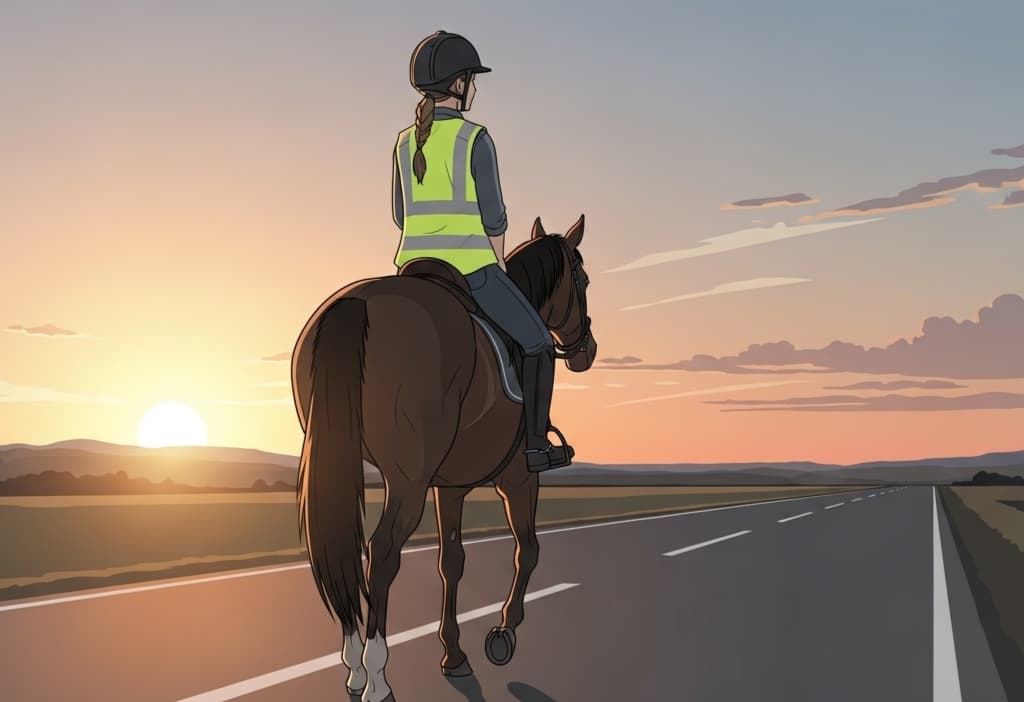
Riding safely starts with preparation and awareness. Always stay alert to your surroundings, such as cars, cyclists, and pedestrians, and ensure your horse responds well to basic commands like stop, turn, and slow. Never ride while impaired.
Wear proper riding gear, including a helmet, to enhance safety and demonstrate responsible behavior. Stick to roads or trails where horseback riding is allowed, noting the distinction between public and private areas, and avoid high-traffic zones whenever possible. Check weather and trail conditions before heading out to maintain control and reduce risks.
What a DUI Lawyer Told Me
A California defense lawyer once explained to me that horseback DUI cases are rare, but they become serious when a rider puts others at risk on public roads. The penalties depend heavily on how much danger the rider created.
Being mindful of these safety practices protects both you and others on public roads. Responsible riding reduces the chance of accidents, legal trouble, and liability claims.
Conclusion
Riding a horse is enjoyable, but understanding the laws around riding while impaired is essential. Some states treat horses as vehicles, which can result in DUI charges, fines, or criminal records. In other states, horses are not covered by DUI laws, but unsafe or reckless riding can still lead to legal trouble.
Staying informed about local regulations, using proper safety gear, and never riding impaired helps keep you and others safe. Responsible riding reduces accidents and liability while allowing you to enjoy horseback riding with confidence.
By following these guidelines, riders can make informed choices, comply with the law, and prioritize public safety on every ride. For additional insight, resources such as this guide on DUI while riding a horse provide further perspective on how courts interpret such cases.
FAQs
Can you get a DUI on a horse in Canada?
Some Canadian provinces extend impaired operation rules to horses on public roads. Enforcement and penalties vary. For example, a rider who loses control near traffic could face fines or other consequences. Riders should check local statutes to stay compliant.
Can you get a DUI on a horse in Washington State?
Horses are generally not considered vehicles for DUI in Washington. Riders can still face charges for reckless or unsafe behavior, such as endangering others on public roads.
Can you get a DUI on a horse in Tennessee?
Tennessee DUI laws apply only to motor vehicles. Horseback riders are not subject to DUI charges, though public intoxication or reckless conduct rules may still apply.
Can you get a DUI on a horse-and-buggy?
In areas with frequent horse-and-buggy traffic, like Ohio or Pennsylvania, local ordinances may treat these vehicles similarly to motor vehicles for DUI purposes. Riders should follow public road rules carefully.
Can you get a DUI on a horse in North Carolina, Montana, or Ohio?
In North Carolina, horses are generally exempt from DUI laws. In Montana, riders may be held accountable under general public safety rules. In Ohio, local ordinances in communities with high horse traffic can hold riders responsible.
